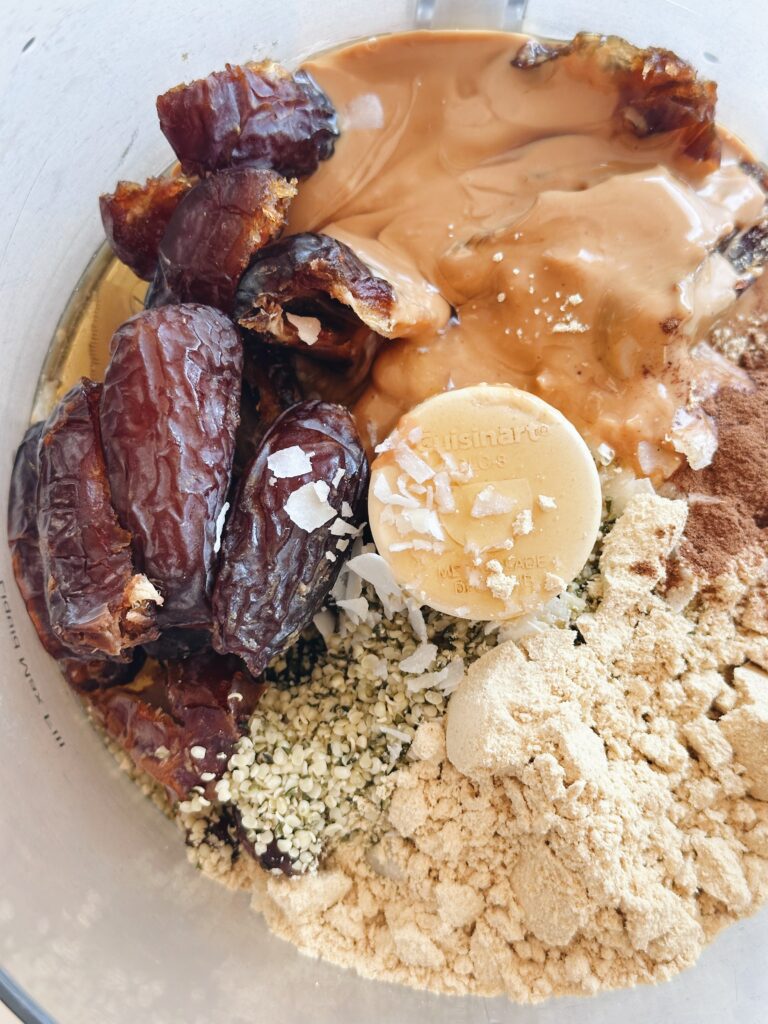More and more, as a parent, athlete, entrepreneur and the type of person who requires the house to be clean and laundry to be folded before she goes to bed, I find myself understanding how convenience foods are a lifesaver for my fellow high-achievers. If I could think of one more thing I could outsource, I would do it. But where our food comes from is just not a place I’m willing to budge on.
My thoughts drifted to just how much more “complicated” I’ve made my own life by holding fast to this rule this morning as I watched little Leo help himself to chunks of muffin and nibbles of fresh figs, proud that his meals and snacks are still very much rooted in the things his parents are making for him from the real, whole foods we spend good time sourcing. As if I didn’t already see the virtues of these decisions in my own mind and body (consistent, symptom-free menstrual cycles, healthy, clear skin, balanced digestion, bulletproof immunity) I can see the benefits of this decision in Leo’s gleaming little eyes, in his brilliant now-healed skin, in his exceptional sleep patterns and healthy digestion. I just can’t go back to eating from packages. And yet there lots of times where I wonder where I’ll find the time to make us something to eat.
The thing is that I always find the time. Last night it was a simple pasta with broccoli + fresh ricotta swirled with lemon, sprinkled with pistachios. The night before, we had simple bowls of beans + quinoa that the InstantPot and rice cooker made for me, topped with fresh radishes, avocado and an herby sauce sourced from our CSA. When it comes to snacks, I can almost always find 15 minutes to make these Chocolate-Peanut Butter Balance Bites to fuel early morning rides, late afternoon boosts, and cooler weather adventures. And on the days when I wanna give up and just feed everyone boxed cereal (which has happened a few times) these are the things that whisper in my mind, egging me on, reminding me that….

The package matters
Ayurvedic medicine reminds us that eating seasonal and local food as a key component of enhancing health. Aligning our diet with the natural rhythms of our environment supports our body’s nutritional needs, strengthens our connection to the earth, and fosters a more resilient health system. This is a far different benefit than that derived from foods that come from packages and this category includes even foods like store-bought almond milk, tofu, and particularly that have labels identifying them as “plant-based, paleo, keto, grain-free, sugar-free.” Dr. Zach Bush – one of my favorite colleagues + inspirators – often emphasizes the difference between whole, locally sourced foods and processed, packaged foods in terms of how they are recognized and utilized by the body. According to his perspective, the body does not recognize or utilize packaged foods as effectively as it does natural, local foods.
Here are 6 reasons why:
Nutrient Density and Bioavailability
- Whole Foods: Local, seasonal foods are generally more nutrient-dense and contain a balance of vitamins, minerals, and phytonutrients that the body can easily recognize and use as fuel. These foods are in their natural state, which means their nutrients are more bioavailable, or easier for the body to absorb and utilize.
- Packaged Foods: Packaged foods often undergo significant processing, which can strip them of their natural nutrients and add synthetic ingredients, preservatives, and additives. This processing splices whole food value and can reduce the bioavailability of nutrients, meaning that even if a packaged food is fortified with vitamins or minerals, the body may not absorb them as efficiently as it would from whole foods.
Chemical Additives and Artificial Ingredients
- Artificial Components: Packaged foods (even “healthy” ones) overwhelmingly contain artificial flavors, colors, and preservatives that are not found in nature and are not recognized by the body as food and/or ingredients that are found in nature, but that the body doesn’t recognize as food because they’ve been parsed away from their whole food formats. Dr. Bush argues that these chemicals and compounds can disrupt the body’s natural processes, leading to inflammation, digestive issues, and other health problems. The body may struggle to recognize and process these artificial ingredients, which can interfere with metabolic functions. Gums and stabilizers are an excellent example of this.
- Toxic Load: Over time, the accumulation of these chemicals can contribute to a higher toxic load in the body, potentially leading to chronic health issues. In contrast, local foods, especially those grown organically, are less likely to contain harmful chemicals and are more in harmony with the body’s natural detoxification processes.
Gut Microbiome Impact
- Microbial Diversity: Ayurvedic medicine highlights the importance of the gut microbiome in overall health. Local, whole foods support a diverse and healthy gut microbiome by providing natural fibers and prebiotics. These foods feed the beneficial bacteria in the gut, which are crucial for digestion, immune function, and even mental health.
- Processed Foods: In contrast, packaged foods are often low in fiber and high in sugars and unhealthy fats, which can disrupt the gut microbiome. And even those that contain high amounts of these foods lack regional specificity that proves beneficial for our microbiome – providing critical information about our local environment. Said simply, our foods serve to connect us to nature, and foods that come from packages effectively DISCONNECT us from our local environment. This disruption can lead to a decrease in beneficial bacteria and an increase in harmful bacteria, ultimately impairing the body’s ability to process and utilize food as fuel.
Metabolic Response
- Natural Metabolism: Whole, local foods are metabolized by the body in a way that aligns with its natural processes. All of the parts are important! They provide a steady release of energy and help maintain stable blood sugar levels. The parts are not equivalent to the whole when parsed.
- Blood Sugar Spikes: Packaged foods, especially those high in refined sugars and simple carbohydrates, but even those that appear innocent on labels lack a reasonable whole-foods balance and cause rapid spikes and crashes in blood sugar levels. This erratic energy supply can lead to insulin resistance, weight gain, and other metabolic disorders.
Connection to Environment and Body
- Seasonal Harmony: Eating local, seasonal foods connects us to the environment and the natural rhythms of the earth, which Ayurveda emphasizes is essential for optimal health. The body is more likely to recognize and efficiently use these foods as fuel because they are in sync with the natural cycles.
- Disconnection: Packaged foods are often produced and consumed without regard to seasonality or locality, leading to a disconnection between the food, the environment, and the body. This disconnection can contribute to a diminished ability to process and utilize these foods effectively.
Energy and Vitality
- Natural Energy Sources: Local, whole foods logically more “alive,” because we are consuming them closer to their moment of harvest. Because the nutritional value of our foods declines as the harvest date fades into the past, local and whole foods are preferable for providing vital energy that supports all aspects of health. These foods are seen as true fuel for the body, nourishing it at a cellular level.
- Empty Calories: Packaged foods often contain “empty calories”—calories that provide energy but little nutritional value. These calories are the result of additives and ingredients required to enhance the flavor, stability or even desirability of the food. The body may get the energy it needs from these foods, but without the necessary nutrients, it can lead to deficiencies and decreased vitality over time.

So let’s make ourselves a batch of balance bites, eh?
…because by simply mixing together ingredients in our very own pantries, with 15 minutes of free time when we find it, we can safely avoid all of the above concerns. AND, they’re delicious!
I love to make these balls with peanut butter, especially in the late summer/fall and winter when a little bit of warming from the peanuts is welcome. In other seasons, I steer clear and use a sprouted almond butter instead. You’ll quickly find by looking at the recipe that there’s a lot of room for personal adaptations here.
Yes, I recommend using sprouted oats here as they’re bioavailable and easier on digestion. And yes, that’s important if you care about nutrient availability and digestive health!
I also love to add my favorite protein powder (a whole, complete and real food) and the most virtuous chocolate chips sweetened with coconut sugar (heart eyes.)
The directions below suggest that you mix the ingredients with a spatula but sometimes I find that my hands are the best tool for the job, I don’t mind getting them dirty to mix and roll here. Once my cute little balance balls are complete I store them in the fridge until I’m ready to eat them. Because of the chocolate, and their soft nature, I don’t typically pack them as travel or adventure snacks in warm weather (no one loves a melty snack,) but this all changes when the weather starts to cool and they become a favorite trail treat too.
I loved these balls while I was breastfeeding because the brewer’s yeast helps boost lactation, but this ingredient also has tremendous benefit for athletes. It’s a rich source of Vitamin B, is a substantial protein source, aids in athletic recovery, boosts immunity and minerality in the body, supports gut health and boosts endurance/stamina. Omit if you wish, or keep this ingredient if you wanna reap the benefits!
Oops, Looks Like You're Not a Member!
That's ok, just sign up or log in to see this recipe.



